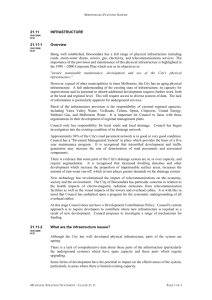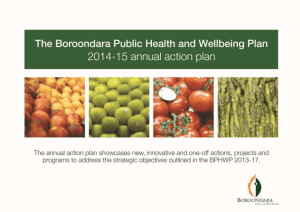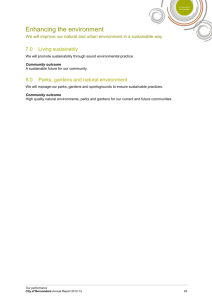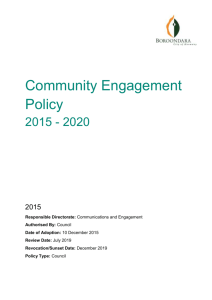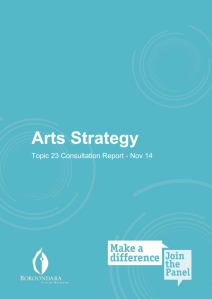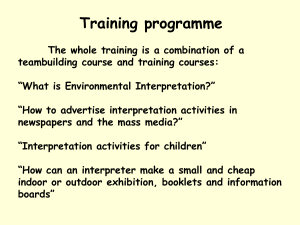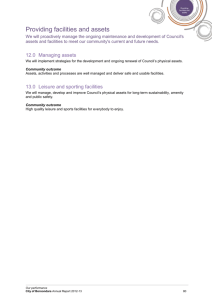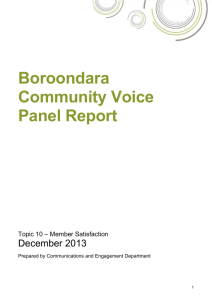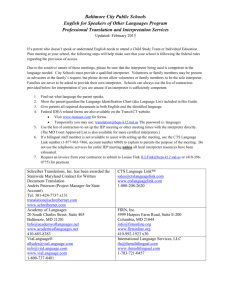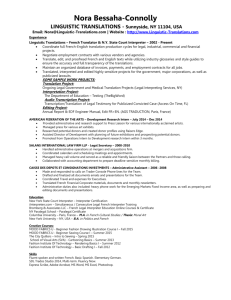Accessible-projects-and-events-guide
advertisement
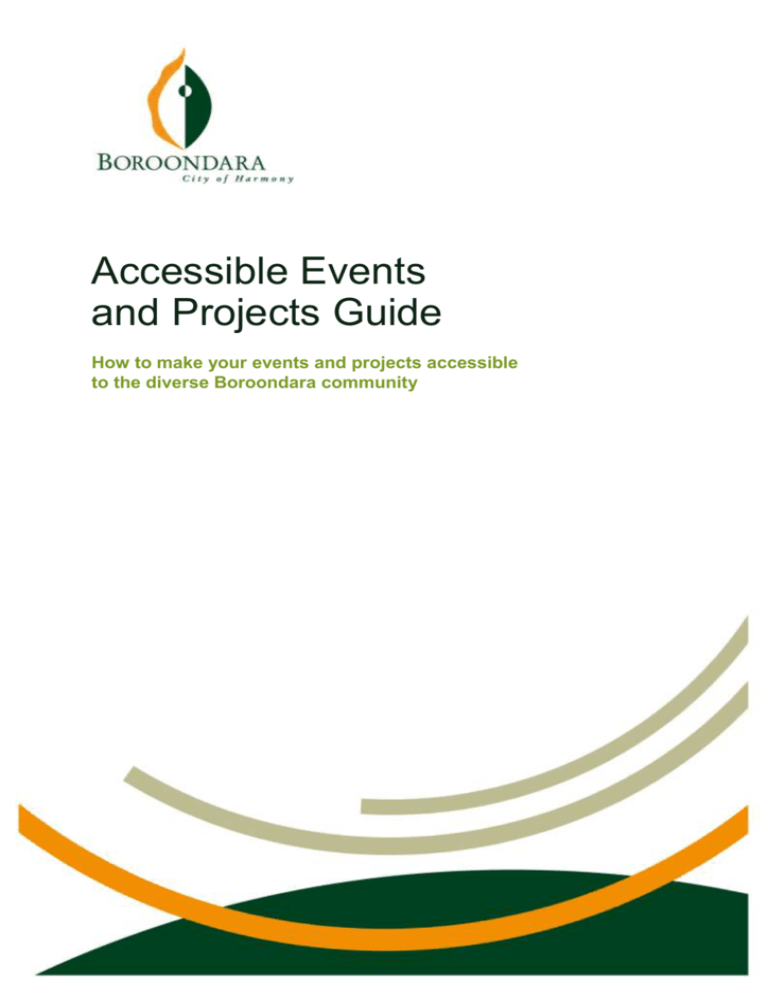
Accessible Events and Projects Guide How to make your events and projects accessible to the diverse Boroondara community 1. Introduction Did you know that approximately 25 percent of Boroondara’s population was born overseas and over 20 percent speak a language other than English at home? Did you know that there are at least 20,560 people with a disability residing in the City of Boroondara? It is important to us that people with a disability and people from diverse cultural and linguistic backgrounds can participate in all community activities, particularly those supported by the City of Boroondara. This guide has been put together to help you make your projects and events accessible. The guide includes: An access and inclusion checklist Information on how these actions can be implemented, and Useful contacts for project and event organisers. For more information on this guide please contact: City of Boroondara Access Equity and Diversity Officer on 9278 4938 or Boroondara@boroondara.vic.gov.au City of Boroondara Metro Access Officer on 9278 4936 or Metroaccess@boroondara.vic.gov.au Accessible Events and Projects Guide How to make your events and projects accessible to the diverse Boroondara community Page 2 2. Access and inclusion checklist for events and projects The venue for your event or project is accessible. Outdoor venues are held on areas that are as level as possible with a firm ground surface. Promotional materials and invitations include an 'access and inclusion support statement' and organisers are responsive to requests. Promotional and written materials include the National Relay Service (NRS) and the Translation and Interpreting Service (TIS) contact details and symbols. Interpreter services (for sign language and languages other than English) have been factored into the project or event plan. Catering is sensitive to diverse dietary requirements. Promotional and written materials are in plain English and are in fonts and colours that are easy to read. Appropriate signage and symbols are used in the promotion of and at the event or activity. For advice on how to achieve these actions in your event or project please read the following pages. Accessible Events and Projects Guide How to make your events and projects accessible to the diverse Boroondara community Page 3 3. Accessible venues It is good to keep access and inclusion in mind in the early planning stages of your event or project, especially when choosing the venue. The lists below of accessible features for indoor and outdoor venues will assist in your venue selection. Every event or project venue should have: Wheelchair accessible doorways and entrances Accessible toilets, and Accessible parking availability. 3.1 What to look for in an indoor venue No steps at the entrance or a ramp option Doorways wide enough to accommodate a wheelchair Accessible toilets Accessible parking bays nearby One storey or lift access to second floor No internal steps or barriers to different areas to be used by participants Registration desks (or tables) that people in a wheelchair can use Accessible stage area (or room for a low portable stage) Clear signage and use of relevant access symbols In fixed seating venues, there are spaces that can be reserved for wheelchair users Microphones, amplifiers and hearing loops Even and slip resistant floor services Tactile Ground Surface Indicators Emergency and evacuation procedures that take account of people with disabilities including people with sensory and/or mobility impairments, and Venue staff can respond appropriately to the requirements of participants with disabilities. See the Australian Standards website in the Useful Contacts section for further information on disability access for buildings. Accessible Events and Projects Guide How to make your events and projects accessible to the diverse Boroondara community Page 4 3.2 What to look for in an outdoor venue A firm level ground surface Accessible parking bays nearby Accessible toilet facilities (or room for a portable accessible toilet) Solid pathways to marquees, stalls and meeting points Adequate shelter and seating (or room to put your own) An accessible stage (or room for a low portable stage) Audience spaces should be large enough to reserve spaces for wheelchair users with a view of the performance space or stage, and Access to power so that cables do not present a trip hazard. 4. Individual needs Provide contact details on your promotional materials so that people can let you know what they need in order to participate. This text or similar can be used: We aim to make this event accessible and inclusive to all of the community. If you would like to attend this event and have specific access, communication or dietary needs please contact [insert name and contact details] before [insert date approximately two weeks before the event] and we will do our best to accommodate you. People may ask you about some of these things: Water bowls and rest areas for companion animals Interpreters and translations First aid and bed facilities Audio recordings of written information Dietary requirements, and Prayer room facilities. For further advice on including and promoting to culturally and linguistically diverse communities contact the Victorian Multicultural Commission (see the Useful Contacts section 9). Accessible Events and Projects Guide How to make your events and projects accessible to the diverse Boroondara community Page 5 5. Interpreter services A participant may contact you to request a sign language or languages other than English (LOTE) interpreter. Take these steps to plan for and book an interpreter: Set aside a budget of approximately $100 per hour for sign language interpreters and $50 for LOTE interpreter services Use the access and inclusion statement in promotional materials and respond to queries If an interpreter is requested, consider which parts of the event or activity they would be needed and what period of time, and Book an interpreter through the following services listed in the Useful Contacts section: - LOTE interpreter services: Translation and Interpreter Service (TIS). - Sign language interpreter services: VicDeaf (Victorian Deaf Society). If you would like people who speak and read languages other than English to contact you via telephone before or during your project, you can register to use a telephone interpreter through the Translation and Interpreting Service (TIS). Once you have registered, the community member can contact TIS and then TIS will contact the organiser and interpret in a three-way telephone conversation. The organiser can also contact community members who do not speak their language through calling TIS to arrange a pre-booked or immediate call. If you would like to use this service, contact TIS to set up a 'Client Code' for your organisation. Phone conversations will then be charged to you at the rates described on the TIS website listed in the Useful Contacts section. If you choose to use this phone service, you can include this statement next to the Interpreter Symbol on your promotional materials in the relevant community languages: If you would like to speak with us through an interpreter or have this information translated, please call us via the free Translation and Interpreting Service on 13 14 50. Accessible Events and Projects Guide How to make your events and projects accessible to the diverse Boroondara community Page 6 6. Catering When arranging catering and choosing food options think about providing some of the following options: Healthy food options with low fat and low sugar content to meet a variety of health needs Vegetarian and vegan options Kosher and Halal options A range of cultural cuisines at larger events Label foods with lists of ingredients to assist people with allergies and sensitivities, and Finger food that is easy to pick up and hold. Accessible Events and Projects Guide How to make your events and projects accessible to the diverse Boroondara community Page 7 7. Written and promotional materials This list will help you make your written and promotional materials, such as invitations, posters and flyers, information sheets and programs clear and easy to read: Use plain English words that most people know in clear, simple sentences Font Size: Size 14-18 Use easy to read font types such as Times New Roman or Arial Use MS Word documents instead of PDF documents. Word documents can be read by screen readers making the information accessible to people with strong vision impairment The clear contrast of background and text will make your document clear and readable. Avoid any background graphics or text (including watermarks) as this will decrease readability If you wish to highlight a section of the text use Bold or a different font type or size. Italics and underlining clutter the text making it more difficult to read When choosing paper types for signage or printed information, matt surfaces are easier to read than gloss surfaces Use the correct symbols in your promotion materials and at your event or activity to let people know what support you are providing, and If you are targeting people with an intellectual disability you can use the ‘Compic’ format. For more information, please contact Scope communication services on 9843 2000. For advice on creating accessible communication for people with vision impairment contact Blind Citizens Australia. Audio versions of written materials for people with vision impairment can be arranged through Vision Australia (see Useful Contacts section 9). Accessible Events and Projects Guide How to make your events and projects accessible to the diverse Boroondara community Page 8 8. Signage and symbols These publically recognised symbols should be used at your event and in promotional materials so that people know what support services and facilities you are providing and where to access them at the venue. Interpreter Symbol Use this symbol at the event or activity to mark where the interpreter services are located or on promotional materials if you are offering a telephone interpreter service. International Deafness Symbol Use this symbol with a caption stating the types of hearing and communication aids available and to indicate where hearing augmentation, sign language interpreters, or communication aids are located. National Relay Service Symbol People who are deaf or have a hearing or speech impairment can contact you through the National Relay Service (NRS). The person will contact the NRS and then the NRS will contact the organiser and interpret in a three-way telephone conversation. Include this statement next to the NRS symbol on your promotional materials: If you have a hearing or speech impairment you can contact us through the National Relay Service on 1300 555 727 for Speak and Listen or 133 677 for TTY/voice calls. International Symbol for Access Use this symbol to promote events or projects that are fully accessible and to mark physical access features such as accessible toilets, ramps and lifts, accessible parking Accessible Events and Projects Guide How to make your events and projects accessible to the diverse Boroondara community Page 9 spaces, and designated seating spaces for wheelchairs. Accessible Events and Projects Guide How to make your events and projects accessible to the diverse Boroondara community Page 10 9. Useful Contacts City of Boroondara Access Equity and Diversity Officer For general access and inclusion queries. Telephone: 9278 4938 Email: elyse.rider@boroondara.vic.gov.au City of Boroondara Metro Access Officer For queries relating to the access to the built environment, community activities and services for people with a disability. Telephone: 9278 4936 Email: david.williams@boroondara.vic.gov.au The National Relay Service (NRS) The NRS is an Australia-wide phone service for people who are deaf or have a hearing or speech impairment. It is also available to anyone who wants to call a person with a hearing or speech impairment. Telephone: 1800 555 630 Website: www.relayservice.com.au The Translation and Interpreter Service (TIS) TIS National is an interpreting service, provided by the Department of Immigration and Citizenship, for people who do not speak English and for the English speakers who need to communicate with them. Telephone: 1300 655 082 Website: www.immi.gov.au/living-in-australia/help-withenglish/help_with_translating/ Accessible Events and Projects Guide How to make your events and projects accessible to the diverse Boroondara community Page 11 Australian Standards For online access to the Australian Standards of disability access when constructing or renovating buildings. Website: www.standards.com.au Blind Citizens Australia For advice on creating accessible communication for people with a vision impairment. Telephone: 1800 033 660 TTY: (03) 9376 9275: Email: bca@bca.org.au Website: www.bca.org.au Human Rights and Equal Opportunity Commission (HREOC) For information on legislative requirements for access and anti-discrimination. Telephone: 1800 134 142 Email: paffairs@humanrights.gov.au Website: www.hreoc.gov.au Vision Australia (incorporating Radio 3RPH) For general information on the access needs of people with a vision impairment and for access to advertising on Radio 3RPH. Telephone: 1300 84 74 66 TTY: 1300 650 871 Email: var.melbourne@visionaustralia.org Website: www.visionaustralia.org.au Accessible Events and Projects Guide How to make your events and projects accessible to the diverse Boroondara community Page 12
